I love Regency Fashion plates. Who doesn’t? We love our costumes, sometimes flattering, sometimes over-the-top. Going through the extant pages from Ackermann’s Repository or La Belle Assemblée, is not so different from watching the red carpet show before the Academy Awards or going through the best- and worst-dressed photos aver the event. Who gets it right? Who is setting a trend? What would we be wearing if we were there?
When we started on a site redesign at The Republic of Pemberley (Yes. I know, I’m always talking about Pemberley. But, in my defense, I spend a lot of my life there and it’s a major point of reference) in 2011, we decided to try to use era fashion plates as a guiding theme of the new design. In preparing for this, I discovered another wonderful facet of Regency fashion plates: their topicality. Of course, the clothes are the focal point of the illustrations and that’s why they were published, but a closer look reveals wonderful little vignettes in many of them. In general, it was the vignettes I focused on when looking for the appropriate image for each of our discussion boards.
Want to see some?
Who can forget Emma‘s many half-finished drawings and determination to take Harriett Smith’s likeness.
The sitting was altogether very satisfactory; she was quite enough pleased with the first day’s sketch to wish to go on. There was no want of likeness, she had been fortunate in the attitude, and as she meant to throw in a little improvement to the figure, to give a little more height, and considerably more elegance, she had great confidence of its being in every way a pretty drawing at last, and of its filling its destined place with credit to them both — a standing memorial of the beauty of one, the skill of the other, and the friendship of both; with as many other agreeable associations as Mr. Elton’s very promising attachment was likely to add.
And how lucky to find a plate (albeit French) of one woman drawing another.
“Dear, dear Norland,” said Elinor, “probably looks much as it always does at this time of year. The woods and walks thickly covered with dead leaves.”
“Oh!” cried Marianne, “with what transporting sensations have I formerly seen them fall! How have I delighted, as I walked, to see them driven in showers about me by the wind! What feelings have they, the season, the air altogether inspired! Now there is no one to regard them. They are seen only as a nuisance, swept hastily off, and driven as much as possible from the sight.”
“It is not every one,” said Elinor, “who has your passion for dead leaves.”
The fashion plate we found for Sense & Sensibility plays off Marianne’s sensibility, translating her passion for dead leaves into a stormy landscape featuring two women. For what is S&S but a story of the sisters?
Persuasion took us to the seaside as Anne Elliot, the Musgroves and Captain Wentworth traveled to Lyme Regis.
Anne found Captain Benwick again drawing near her. Lord Byron’s “dark blue seas” could not fail of being brought forward by their present view, and she gladly gave him all her attention as long as attention was possible. It was soon drawn, perforce, another way.
What would you take to walk on the cobb and examine the ships coming into port? A telescope, naturally.
Speaking of the sea, for Mansfield Park, we thought that we’d place our beloved Fanny Price at Portsmouth, her birthplace and the scene of one of distress and realization.
“I have to inform you, my dearest Fanny, that Henry has been down to Portsmouth to see you; that he had a delightful walk with you to the dockyard last Saturday, and one still more to be dwelt on the next day, on the ramparts; when the balmy air, the sparkling sea, and your sweet looks and conversation were altogether in the most delicious harmony, and afforded sensations which are to raise ecstasy even in retrospect. ..”
For our last two novels, we chose, not vignettes but individuals. Northanger Abbey is Catherine Morland’s novel and the fashion plate we chose, a young woman from the back, makes me think of Catherine during her first visit to the Upper Assembly Rooms.
The company began to disperse when the dancing was over — enough to leave space for the remainder to walk about in some comfort; and now was the time for a heroine, who had not yet played a very distinguished part in the events of the evening, to be noticed and admired. Every five minutes, by removing some of the crowd, gave greater openings for her charms. She was now seen by many young men who had not been near her before. Not one, however, started with rapturous wonder on beholding her, no whisper of eager inquiry ran round the room, nor was she once called a divinity by anybody. Yet Catherine was in very good looks, and had the company only seen her three years before, they would now have thought her exceedingly handsome.
For Pride & Prejudice, who else but Fitzwilliam Darcy? I dare say that, when Pride & Prejudice is mentioned, not a one of us does not first think of Mr. Darcy. How could it be otherwise?
Mr. Bingley was good-looking and gentlemanlike; he had a pleasant countenance, and easy, unaffected manners. His sisters were fine women, with an air of decided fashion. His brother-in-law, Mr. Hurst, merely looked the gentleman; but his friend Mr. Darcy soon drew the attention of the room by his fine, tall person, handsome features, noble mien, and the report, which was in general circulation within five minutes after his entrance, of his having ten thousand a year. The gentlemen pronounced him to be a fine figure of a man, the ladies declared he was much handsomer than Mr. Bingley, and he was looked at with great admiration for about half the evening, till his manners gave a disgust which turned the tide of his popularity; for he was discovered to be proud, to be above his company, and above being pleased; and not all his large estate in Derbyshire could then save him from having a most forbidding, disagreeable countenance, and being unworthy to be compared with his friend.
The process of finding the right fashion plates for each of the discussion boards on the Republic of Pemberley site was a lot of fun and revealed things about the novels and about the fashion plates that we might not have noticed before. We also enjoyed finding just the right plate for each of our non-Jane boards.
I imagine we all have different images in our minds for Jane Austen’s settings and characters. What would you picked for each of the novels?

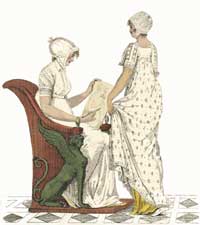

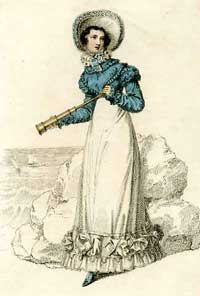
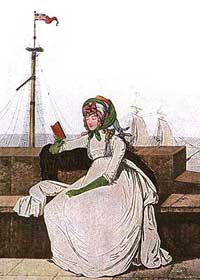
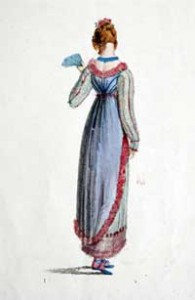
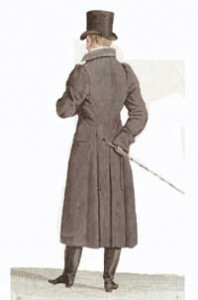
Great choices! I particularly love the Northanger Abbey plate. As for P&P, why women ever let men stop wearing those awesome hats is a mystery.
I love all your choices, too. Agree with Bess about the hats, but as I was checking out that image I noticed what tiny feet he has. Maybe the artist thought that looked more elegant?
great blog, Myretta!
Lovely blog! And I love all of your choices for the novels. Regency fashion prints can be quite addictive, but do not bid against the Divine Diane Gaston on one at auction. She is ruthless. LOL
Thanks, Ladies. And thanks for the tip about Diane, Louisa. I’ll keep an eye out for her ruthlessways.
Thank you for sharing the fashion plates. I enjoy looking at period pictures of clothing. Depictions done at a later date are often idealized and not as accurate. When I read, it picture in my mind what I think the outfits look like and might not be totally accurate. It is nice to have period fashion plates to refer back to at times to remind myself what the clothing really did look like.
Thanks for sharing.
I examine some terrific goods the following. Surely amount bookmarking pertaining to revisiting. My spouse and i amaze precisely how a great deal try out you place to generate a really excellent helpful website.